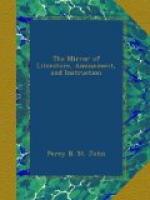* * * * *
The Selector;
AND
LITERARY NOTICES OF
NEW WORKS.
THE NEW-YEAR’S GIFT AND JUVENILE SOUVENIR FOR 1830.
Edited by Mrs. Alaric Watts.
The association of the line—
In wit a man, simplicity a child—
is so happy as to be applicable to the Poet of all Nature. It expresses as much, if not more merit, than any single line often quoted, and its frequent repetition has probably induced us to consider the latter half—“simplicity a child”—as the peculiar talent of writing for young people, aimed at by many, yet accomplished by so few. What is it that so delights the young reader—we may say ourselves—in Robinson Crusoe[3]—the Shakspeare of the play-ground—but simplicity; and where, among the thousands of nursery books that have since been written, can we find its match? In childhood, youth, manhood, and old age, this is the great charm of life; and even the vitiated appetite is not unfrequently coaxed into amendment by its very delightful character when contrasted with coarser enjoyments. Metaphysicians deal out this fact to the world over and over again, and all the philosophy of Locke, Newton, and Bacon would be of little worth without it.
[3] A few weeks since we gave
a copy of Robinson Crusoe to a young
man,
“whose education had been neglected,” and
who had never
read
this delightful book: the account of his delight
from its
perusal
has more than recompensed us tenfold.
But this is too philosophical a strain for noticing a child’s book—a little volume that is among books what a child is in human nature—“man in a small letter;” and such is Mrs. Watt’s “New Year’s Gift.” To express all the kindly feelings which it must produce in a mind occupied as ours often is with graver matters—would be only to repeat what we said a fortnight since; and so without further premise, we will open this little casket of gems for the reader. We shall not string names together, but take a few of them. First, the “Sisters of Scio,” a true story, by the author of “Constantinople in 1828,” of two little Greek girls being saved from the Turks, by a good Christian. Next is “The Recall,” by Mrs. Hemans:—
Music is sorrowful
Since thou wert gone;
Sisters are mourning thee—
Come to thine own
Hark! the home voices call,
Back to thy rest!
Come to thy father’s hall,
Thy mother’s breast!
O’er the far blue mountains,
O’er the white sea-foam,
Come, thou long parted one!
Back to thy home!




